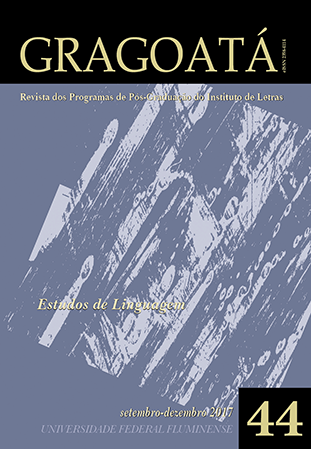A inovadora linguística saussuriana e a língua lituana
DOI:
https://doi.org/10.22409/gragoata.v22i44.33555Palabras clave:
Linguística saussuriana, Lituano, Gramática histórico-comparadaResumen
O objetivo deste artigo é mostrar o que há de inovador na proposta linguística de Ferdinand de Saussure, ao mesmo tempo que a situa no ambiente intelectual da pesquisa em linguagem do século XIX. Nossa intenção é tornar mais complexas as imagens associadas a esse autor, que muitas vezes vê seu papel reduzido por epítetos como “pai da linguística”, “fundador do estruturalismo” ou cuja contribuição aos estudos da linguagem por vezes leva em conta apenas o Curso de linguística geral. Através da leitura dos textos publicados em vida que abordam a língua lituana, assim como uma parte do manuscrito Notes sur l’accentuation lituanienne, apresentamos o funcionamento teórico do que consideramos ser o núcleo do pensamento saussuriano, a diferença. No que diz respeito à língua enquanto objeto da ciência saussuriana, a diferença se desdobra em três aspectos, a saber, a imaterialidade, a virtualidade e a relatividade. Após apresentar esses três elementos do que chamamos de linguística da diferença na primeira seção do trabalho, consagramos a segunda aos trabalhos em torno do lituano, trazendo um breve sumário de seu papel na obra do linguista. Na última seção, introduzimos os leitores às Notes sur l’accentuation lituanienne e analisamos alguns de seus aspectos teoricamente inovadores. Esperamos, assim, deslocar a imagem tradicional do autor Ferdinand de Sassure, possibilitando que esse nome de autor invoque também outras formas de se produzir conhecimento nos estudos da linguagem e que não se perca de vista sua participação ativa na comunidade científica da gramática histórico-comparada.
---
DOI: http://dx.doi.org/10.22409/gragoata.2017n44a1016
Descargas
Descargas
Publicado
Número
Sección
Licencia
AUTORIZAÇÃO
Autores que publicam em Gragoatá concordam com os seguintes termos:
Os autores mantêm os direitos e cedem à revista o direito à primeira publicação, simultaneamente submetido a uma licença Creative Commons Atribuição 4.0 Internacional (CC BY 4.0), que permite o compartilhamento por terceiros com a devida menção ao autor e à primeira publicação pela Gragoatá.
Os autores podem entrar em acordos contratuais adicionais e separados para a distribuição não exclusiva da versão publicada da obra (por exemplo, postá-la em um repositório institucional ou publicá-la em um livro), com o reconhecimento de sua publicação inicial na Gragoatá.
A Gragoatá utiliza uma Licença Creative Commons - Atribuição CC BY 4.0 Internacional.











